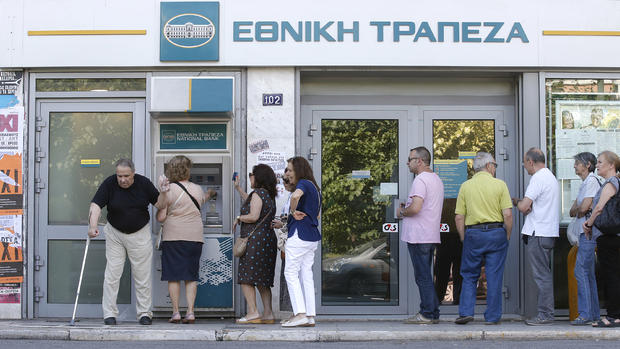Greece could be grinding toward a deal
The Greek financial soap opera has reached a critical juncture.
Officials from the European Central Bank (ECB) and the International Monetary Fund (IMF) today are discussing the three-year, 53.5 billion euro ($59 billion) bailout request the Greek government submitted yesterday. The plan includes tax increases and spending cuts worth about 13 billion euros ($14 billion). The austerity package is actually larger than the one Greek voters rejected in the July 5 referendum because the nation's economy has deteriorated so sharply in recent weeks.
The evaluation process will continue at Saturday's gathering of the eurozone's finance ministers and Sunday's summit of the region's political leaders. Greece's parliament is also going to pass judgment on the request soon. It still remains unclear, however, if Germany -- Greece's largest creditor and staunchest advocate of further austerity measures and opponent of any debt reduction -- will go along with it. A spokesman for German Finance Minister Wolfgang Schäuble told the The New York Times the outcome of Saturday's meeting remains "completely open."
Any Greek bailout would likely include some restructuring of the country's debt by pushing out repayments decades into the future. Greece has long argued that its debt levels, which equal about 170 percent of GDP, are unsustainable and should be cut, a view many economists back. Germany, though, has ruled out a cut in the nominal value of Greece's debt because of concerns that it would set a precedent for other countries to follow, also known as "moral hazard."
"The initial proposal of the creditors was in the 'Jerry Maguire' spirit of 'show me the money' ... they wanted reforms first, performance (in terms of growth and fiscal deficit) second, and then they provide debt forgiveness," wrote Roberto Rigobon, an economist at MIT's Sloan School of Management. "The Tsipras proposal is mostly changing the order, trying to get debt forgiveness at the same time reforms are announced and definitively before economic performance is observed. ... To me, even though the reforms are identical, the sequence matters a lot, especially in terms of economic performance."
The next key debt deadline for Greece is July 20, when it's scheduled to make a 3.5 billon euro ($3.85 billion) payment to the ECB. But further assistance from the IMF isn't available after Greece failed to make a June 30 payment to that organization, and its previous bailout package from its European neighbors has also expired.
Some economists such as Erik Jones, director of European and Eurasian Studies at Johns Hopkins University's School of Advanced International Studies, aren't sure if a debt deal can be reached by that deadline. "That will put the ECB in an impossible situation of having to accept collateral backed by a Greek state that cannot honor its own debts. If that should come to pass, we will face a disorderly exit of Greece from the euro."
'The Greek side wanted the issue that Greek debt is unsustainable to be tackled in any new agreement," wrote Christian Odendahl, chief economist of the London-based Centre for European Reform, in an email. "Since Greece now needs technically a new program, and Germany insists on the IMF's participation, new money can only be lent to Greece from the IMF and the ESM (European Stability Mechanism) if the debt of Greece is sustainable over the medium to long term."
However, Odendahl added, "Since that is not the case, according to the IMF, the issue of debt restructuring for Greece needs to be addressed now in one way or another."
Greece's banks have been shut for almost two weeks, and citizens can withdraw only 60 euros ($67) per day from ATMs. Economic activity is grinding to a halt. Greece's GDP has shrunk by 25 percent since 2007 and its unemployment rate tops 25 percent, conditions last seen in the U.S. during the Great Depression.
U.S. stock markets, which have been depressed by the Greek situation, shot higher on Friday fueled by optimism that a deal was finally on tap. The Dow Jones industrials surged 211 points, or 1.2 percent, to close at 17,760, and the euro rallied.
"The Greeks are bending over backwards to come to some sort of agreement," wrote Johns Hopkins' Jones. "Even Greeks who thought they had seen the bottom have now looked over the precipice. That is a horrible experience for any country, and I am sure they are eager to get things back to 'normal' as quickly as possible -- even if normal is the very poor situation they had before the referendum was called and capital controls were introduced."
